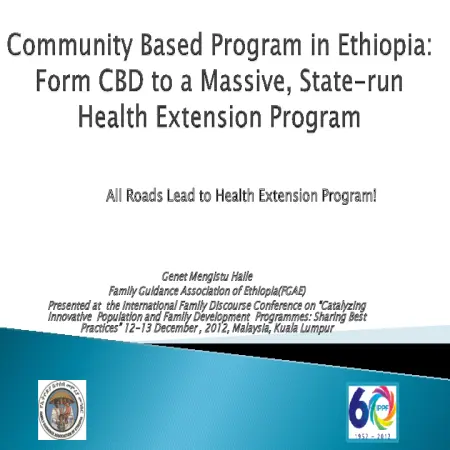|
Community based program in Ethiopia: from CBD to massive, state-run health extension program
|
|
: 43063 Views : |
| Item type | Conference or Workshop Item |
| Subjects | 300 Social sciences > 305 Social groups |
| Division/Agency | LPPKN - National Population and Family Development Board, Malaysia: Population and Family Research Division |
| Keywords | Health extension program, Community based program, Health extension workers |
| Additional Information | This paper have been presented at the International Family Discourse "Catalysing Innovative Population & Family Development Programmes: Sharing Best Practices" in Hotel Renaissance, Kuala Lumpur |
| Abstract | The Family Guidance Association of Ethiopia (FGAE) pioneered a Community-based FP Distribution [CBD] program in Ethiopia in 1991. The CBD agents were selected by the community members through prior set selection criteria including interest and willingness to volunteer for community work and sufficient knowledge about the socio-economic and cultural context of the community. The CBD program was very widely replicated by many other institutions as a low cost, effective strategy to increase access to modern contraceptive services in under-served communities. Considering the challenges related to distance and access to fixed health facilities among women with high unmet needs and the lessons drawn from project based success stories of the CBD programs, the government of Ethiopia initiated the Health Extension Program (HEP) in 2003 to accelerate utilization of primary health care services in rural communities. The HEP is implemented by trained health extension workers or practitioners at the community level with strong focus on health promotion and disease prevention and empowering community members to make decisions and take actions on their own health. The Health Extension Workers (HEW) were recruited from the community among those who completed high school and trained for one year. Currently, two female HEWs are assigned at each kebele (the lowest administrative unit) and to implement a package of 16 primary health care services including FP and maternal health. A total of about 35,000 rural HEWs and 4,800 urban Health Extension Professionals [Graduate Nurses] are deployed by MoH as government employees throughout the country. The program has created a better opportunity, particularly for rural women and young people to access health services including FP/RH. |











